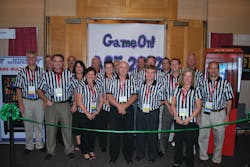In October, 700 attendees and exhibitors converged on the Embassy Suites Hotel at Kingston Plantation in Myrtle Beach, S.C. for the networking, educational sessions and tradeshow promised by the Atlantic Coast Expo (ACE).
Attendees were educated by Heidi Chico, president of the Wittern Group about regulations affecting the vending industry such as the side and forward reach heights required by the new American’s with Disabilities Act. Those requirements are currently in effect for vending machines and micro market kiosks, according to Chico. While existing machines are grandfathered in, Chico went on to say that any change to a location or machine means it will no longer be compliant and needs to be retrofitted or swapped out. The Department of Justice will be enforcing the compliance law and the first offense could be a fine of up to $55,000, with subsequent violations reaching $110,000. However, the fines will be delivered to the location. The industry has asked for a “Right To Cure” clause in the act, which would allow an operator to correct a machine in violation before getting a fine. “We need some protection from litigation,” said Chico.
Micro markets drew a large crowd
Following the regulation update, a panel of operators shared their micro market experience. The five operators got into micro markets for varied reasons including customer requests, adding cashless, staying competitive and being a leader. All operators reported increased sales at the locations with markets, compared to vending machines. Many said service calls were non-existence. Fresh food sells especially well in micro markets, operators found. Food is usually a loss leader in vending, but Carl Moser of Cardinal Canteen in Clarinda, Iowa reported it represented 30 percent of his micro market revenue. Spoilage is counter balanced because operators could charge higher food prices in markets than consumers would accept in vending machines.
Healthy products played a role in micro market growth. Operators averaged 300 SKUs per market of product, many of are considered healthy.
Creating excitement around a market opening, such as doing a raffle or offering credits in users accounts, can drive sales. Scott Halloran of Trolley House Refreshments in Richmond, Va. does an on-site raffle when he opens a micro market to draw interest and teach people to use the kiosk at the same time.
Mike Lawlor from USA Technology encouraged operators to move beyond clean, filled and working and invest in technology. He reported advantages of cashless, such as a 15 to 20 percent increase in top-line sales revenue across all categories. He also discussed advantages of two-tier pricing, where a $.10 discount is given for paying cash at a machine.
Randy Smith from LightSpeed Automation discussed how to choose a technology provider. He recommended those who partner with the operator, integrate their systems with existing technology and have longevity.
Christ Gomez from Vendors Exchange International Inc. reviewed touchscreens, intelligent vending (cameras on machines collecting demographics), machines interacting with customers’ smartphones, product recognition delivery systems, dynamic price changing and services using the cloud, all possible with new Intel architecture within the vending machine.
Industry awards presentation
The association also recognized a number of its members on Saturday morning. Alvin Huffman, Northwest Food Service was named 2012 North Carolina Vendors Association Vendor of the Year. Mike Frye, Southeastern Vending Services was named 2012 North Carolina Vendors Association Supplier of the Year.
The Virginia Automatic Merchandising Association named Rick Matthews, of HL Toms, 2012 Vendor of the Year.
Wayne Seagraves of Canteen Vending and the ACE 2012 Chair, was given the chairman’s Award.
Next year’s ACE will be held Oct. 3 to 5, 2013 at the Embassy Suites Kingston Plantation in Myrtle Beach, S.C.







